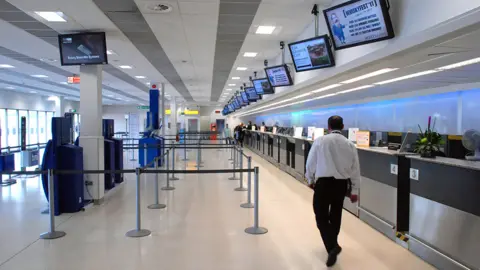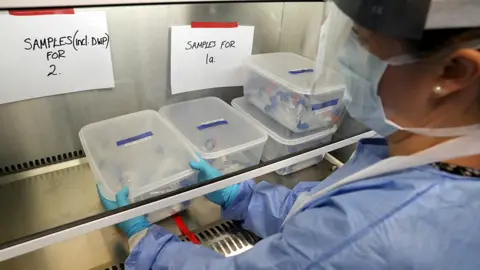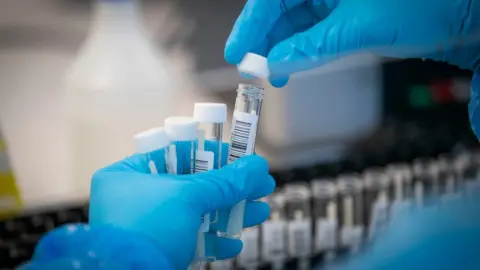Covid in Scotland: Contact tracing after Brazilian strain detected
 AFP
AFPAn enhanced contact tracing effort is under way after the Brazilian variant of Covid-19 was detected in Scotland.
Three Scottish residents tested positive for the new strain after flying into Aberdeen from Brazil, via Paris and London.
National clinical director Professor Jason Leitch said they were oil workers who were returning to their families.
Other passengers who were on the same British Airways flight from London on 29 January are now being contacted.
Experts believe this variant (P1) - first detected in northern Brazil in January - could be more contagious.
However Health Secretary Jeane Freeman said there was "currently no reason to believe" the variant was circulating in the community in Scotland.
A total of 20 passengers who were on flight BA1312 have already been contacted, and Ms Freeman said work was under way to get in touch with others.
Prof Leitch told BBC Scotland's The Nine that situation in Aberdeen had been "well-handled" by the individuals, their families and employer.
Asked if he was concerned the north-east was a gateway to new variants via the oil industry, he said: "It's certainly a part of the country we need to be concerned about".
Three other cases have also been detected in England, but they are not linked to the Scottish cases.
Officials are still trying to track down one of those who tested positive for the new variant in England.
 Getty Images
Getty ImagesJillian Evans, head of health intelligence at NHS Grampian, said the three Scottish travellers had arrived in Aberdeen in early February, before new rules on hotel quarantine came into force.
She told BBC Radio's Good Morning Scotland programme they had isolated together for 10 days after arrival in accommodation provided by their employer.
They tested positive while in isolation, having developed symptoms after arriving there.
Ms Evans said that health protection specialists were now following up "contacts of their contacts" in an effort to ensure that any further cases were found quickly.
Anyone traced will be offered a Covid-19 test.
"That's not standard procedure, that's going one stage further," she said.
"But of course they have been quarantined for 10 days in managed isolation for that period of time, so you would think that they wouldn't have many contacts to follow up.
"Nonetheless, that's an added precaution that's been taken by health protection specialists."
 PA Media
PA MediaProf Leitch, said it was the first time the Brazilian variant had been detected in Scotland, but told BBC Scotland there was "no evidence" of community spread.
He said the three travellers had tested negative before leaving Brazil.
"The measures that were in place at the time of this were really quite rigorous," he said.
"These individuals self-isolated. They were from a high risk country, so they followed the instructions and there is no suggestion of any blame or concern about their behaviour. I think that's very important."
Prof Leitch added that "enhanced" contact tracing was necessary in this case because of concerns about the Brazil strain's resistance to immunity.
'Very effective'
"The reason why we're worried scientifically is we're not absolutely certain that this version is amenable to the natural immunity some people already have and the artificial immunity we are creating with vaccination," he said.
"Everything we know says it's still very effective, but we just can't be sure yet because it hasn't been around long enough and the trials haven't completed."
Both the Scottish government and Public Health England said the variant had been designated "of concern" as it shared some important mutations with the variant first identified in South Africa - known as B.1.351.
One of these mutations - called E484K - may help the virus evade parts of the immune system called antibodies.
Chief Medical Officer Dr Gregor Smith said it was important to be "vigilant" for changes to the virus, with the vaccine programme placing greater pressure on it.
He said: "We must continue to suppress transmission to the lowest possible level - the more virus there is around, the more likely these mutations are to appear."


